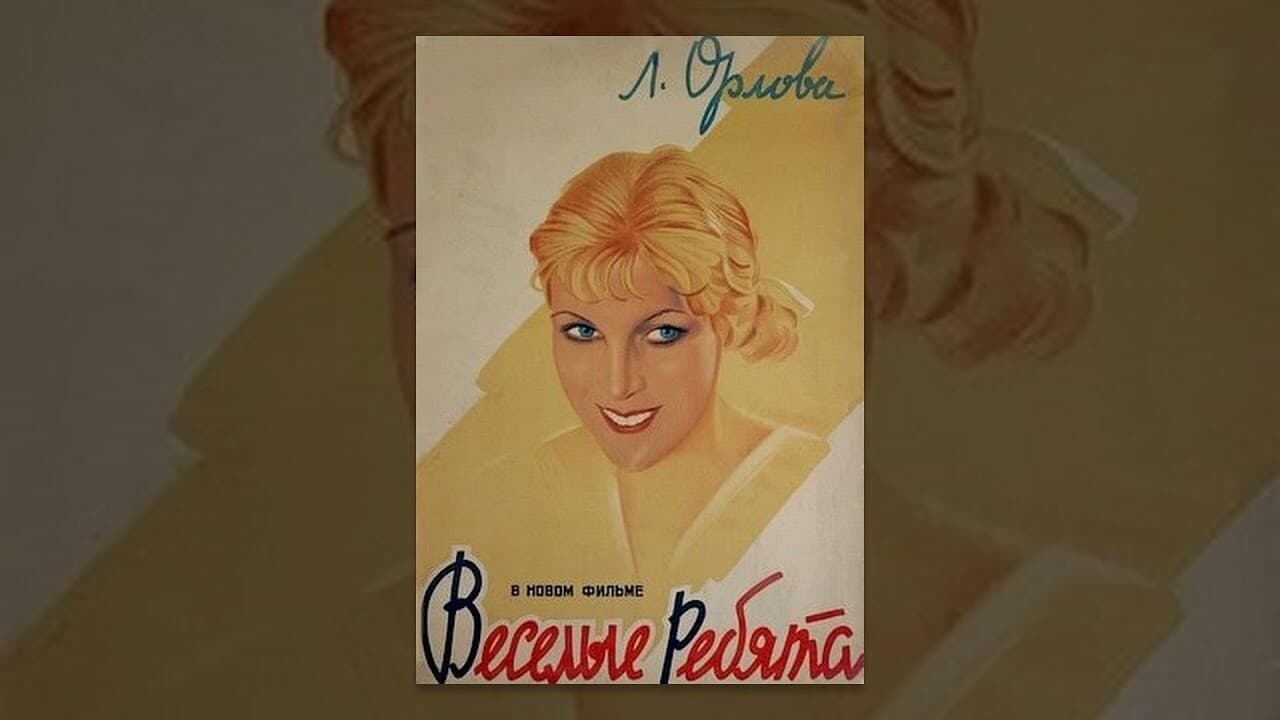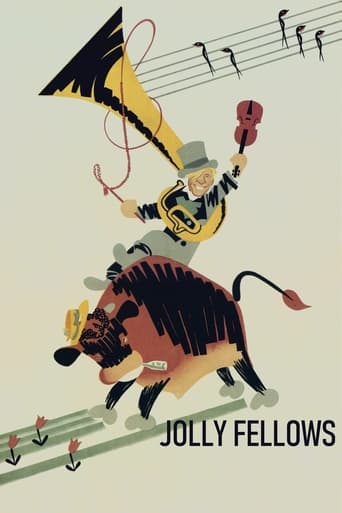

I was surprised about this picture , especially the year it was made. Due to the economical problems in Russia at the time , Russia was late in putting sound equipment in the theaters . You see I had seen at the Egyptian theater , Hollywood, a silent picture about Russia going to the moon. Guess when it was made ?1935 with sync sound affects and music no dialog but title cards. Russia was late in the sound era thanks to Communism.But since Iv'e been used to seeing only the most worlds famous success international Russian film classics, like Ivan the terrible,I thought all Russian films were like those of Esiensteidt, Sergie that is.With messages only.The greedy big distributors of classic films only want to release in United states ,only the most successful classic for the fast buck.Leonid Utyosov plays a Charlie Chaplin type character . A successful Shepard. You see him marching down the village with his farm animals singing.Later he does a roll call and all the animals respond. It be difficult for him to butcher any of these animals for food cause he's too attach to them.Well, after that his father shows up and ask him to study his violin lessons. all of a sudden in his close up he changed , his hair was automatically neatly combed, plays the violin. The peasant girl ,played by Lyubov Orlova, is admiring him and is in love with him. After his lessons he jumps in the ocean for a swim. He ends up at the tourist side of the beach . He meets a dark hair women, he never tells her that he's a Shepard,she thinks he's just a musician. She invites him to her party but all his animals start to follow him. He discovers that the peasant village girl works at in her house. So when the record player breaks down he's asks to play music .He plays the flute with piano accompanies with. But all of a sudden this influences his animals to come into the house a wreak havoc with the dining room. They start to enter the living room and he stars to notice it as the peasant girl comes out to bring some plants. He signals to her whats behind her . she notice's. One of his cows . She pulls it back and tries to kick it out of the house.Finsally the guest notices it and they wreak havoc the camera speeds up for the comedy effects . Destroying the property of the house and the Shepard trying to get his animals out of the house. The women later finds out he's a Shepard and rejects him. Out of the place as he gazes at the sea he expresses frustration about being a Shepard to the peasant girl who's trying to let him know She's in love with him. He decides to leave for the big city . He arrives in front of the art deco theater where he plans to get a job as a musician. But he's pushed into the theater thinking he's one of the workers to send flowers.Havoc is wreaks again as he being chased by the security . He goes to the dressing room of the orchestra leader and disguised him self . Being chased by the guard he ends up at the stage being forced to conduct the orchestra. He notice's that the women he's in love with is at the balcony watching the show.She notice's him and throws him a flower.He's a hit, only to be chased by the security guard. Some musicians rescue him and he joins their jazz band . Durring rehearsals one of the musicians have an argument with another and it turns into a slapstick speed ed up fight.In which after that fight they all go to doing a job for an advertisement for funeral service only to discover that the peasant girl is in town. All of them going to a theater that they have an engagement at. Their instruments broken cause of the fight . They star to impersonate instruments.The peasant girl turns into a 1934 show girls and sings and dances. ending up with a choruses of ballet dancers.Now you can say that this film had some propaganda the Shepard and the peasant girl. the upper class beach and the upper class girl he fell in love with . He wreaks havoc with the upper class. But peasant life versus city was cultural fact in Russia and Charlie Chaplin shorts where released in that country too. Obviously copying Chaplin antics about the poor messing things up with the rich any how,Advetures of Tillie. That wasn't communist propaganda a . Too bad TCM is greedy to premiere this on TCM import.But it isn't a worlds famous film. Revenge of the camera man is etcetera,
... View MoreIt is a highly musical film completely devoid of any depression and political propaganda. Such films help us to get a close look at ourselves and to understand how lazy we all are nowadays ("we are a lazy generation" - remember "Burnout 3: Takedown"?). Look at today's musical films - they cannot keep the pace with this old comedy. The film was restored in 1978 (if I remember it correctly) and the version I've watched is pretty good. During singing the movement of the actors' lips and the sound of the voice are not always matching each other but that's not important. The quality of the sound is very satisfactory and lets the viewer hear wonderful voices of our best 20th century actors in their full glory.Among the numerous funny scenes I would like to point out the following "signature moves" which really attracted my attention:1) the camera's glide along the bodies of sunbathing holidaymakers (feet, backs, buttocks, feet, feet, backs, etc.) - that's something I've never seen in a movie; 2) the "beat-'em-all" sequence: the ultimate "disassembly" of the whole band (instruments included) - that's something even Mr Jacky Chan has to watch closely and admire; 3) "the raining race": the guys from the band "Merry Fellows" are riding a catafalque to get to the theatre and this race looks simply insane.Together with "Volga - Volga" (1938) it is a brilliant example of our best musical comedies. If you should call some classics of this genre "cult", then don't forget "Vesyolye rebyata" (1934). It is one of those examples when you can easily skip the imperfections and enjoy the whole piece.Mr Leonid Utyosov gives, quite possibly, his best performance and Mrs Lyubov Orlova shines again. When I have more time and inclination, I shall add more details to my comment. Meanwhile, 10 out of 10. Thank you for attention.
... View MoreThis first Soviet musical comedy on film still shows signs of silent era mentality, mainly because the sound is so poorly coordinated with the picture, as if it were an afterthought, but also because the gags are predominantly visual. You'll wince at many of the shots too, especially those close-ups of the actors delivering each single line -- it's hard to be subtle when the camera's 18 inches from your face. Also obvious is the political subtext -- a jolly peasant demolishes the upper crust's airs and way of life. It's interesting that, in this as in many Soviet films that try to be light-hearted, food and drink fairly tumble off the screen, as if to feed those in abject poverty who have come to watch it.For all that, the director, Grigori Aleksandrov, challenged himself and his crew with some awesomely complex shoots. The opening scene of the shepherd marching his animals out of the pen and through the farmland, past peasants and workers, is quite lengthy, but only involves four takes spliced subtly together. (Oh, but would the sound have matched better!) Similarly, the would-be female singer strolls down the beach past a cornucopia of beach activity, some in the extreme foreground, some mid-field, some in the back behind her. It's one long take, and yet it manages to be interesting and funny at times, and it even manages to set up a later gag while it's at it.And the music: It's jazz from the acoustic era, with tubas providing the bass line, pretty quaint and good-timey. But about half of the music in the soundtrack is full orchestral material composed by Isaak Dunayevsky, with a rousing salute to the simple peasant life getting a full-blown treatment both at the beginning and the end of the picture, the equivalent of Socialist Realism for music. It's a great little melody you can whistle on the way home as you wonder where your next meal will come from.
... View MoreHappy rustic with a song, sheepskin hat, pan pipe and singing animals leads his herds to pasture and greets the workers and peasants. While swimming a mix-up occurs and he is taken for a famous conductor. Adulating fans lead him about but when invited to display his musical talents at a party, he forgets himself and uses his pan pipes, thereby inviting in all the local animals. Farce with animals eating the dinner and ruining the performance. The rustic is expelled, but then redeemed the following day when the real conductor is injured and the rustic takes his place, performing brilliantly. As a reward he is then given his own music school, and band. The film ends with Love + A Singing Milk Maid, + hundreds of dancing extras. Unique!
... View More